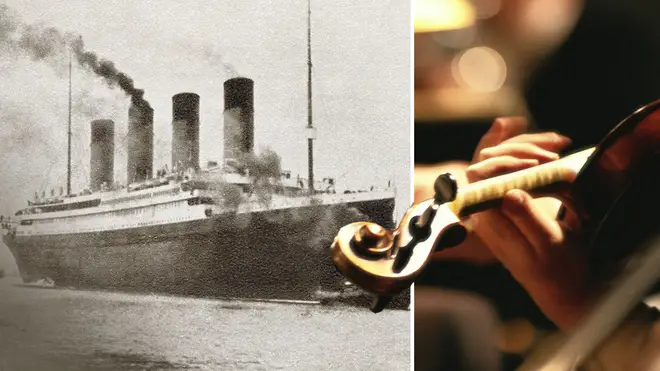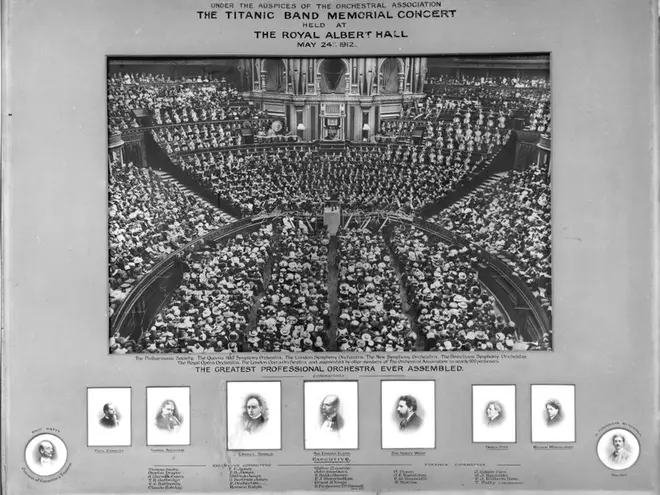On Air Now
Calm Classics with Myleene Klass 10pm - 1am
9 June 2021, 15:37 | Updated: 9 June 2021, 17:33

London Symphony Orchestra very nearly set sail on the fated maiden voyage of RMS Titanic on 10 April 1912. Here’s the story of these musicians’ near miss.
On 15 April 1912, five days after it had set sail for the very first time, RMS Titanic sank in the North Atlantic Ocean after colliding with an iceberg.
Among the 1,500 people who died on that tragic day were famously the ensemble of musicians, led by bandmaster Henry Wallace Hartley, who kept on playing until the ship’s final descent below the ocean’s surface.
“Many brave things were done that night, but none were more brave than those done by men playing minute after minute as the ship settled quietly lower and lower in the sea,” Titanic survivor Lawrence Beesley is recorded as saying.
Hartley performed music on the Titanic alongside fellow violinists John Law Hume and Georges Alexandre Krins, pianist Theodore Ronald Brailey, cellists Roger Marie Bricoux, Percy Cornelius Taylor and John Wesley Woodward, and double bassist John Frederick Preston Clarke.
But these musicians, all of them employees of Liverpool-based agency C.W. and F.N. Black, weren’t the only ones slated to feature on the Titanic’s maiden voyage.
In fact, musicians of the London Symphony Orchestra (LSO) were booked originally to take part in the journey.
Read more: Can you put the musical instrument in its correct place in the orchestra?

Brahms Symphony No 1 // London Symphony Orchestra & Valery Gergiev
In an almost unbelievable near miss, White Star Line schedule changes saw them travel to the US on an alternate ship a week earlier.
The orchestra’s sea voyage was going to be part of its 1912 tour of the United States, the first British orchestra ever to do so.
An accident in testing one of her sister ships meant the maiden voyage of the Titanic was delayed, leaving the LSO to sail on the ship’s replacement, the SS Baltic, so that they could stick to their tour concert commitments.
“They had to go on the Baltic instead, which was the real reason they never got on the Titanic,” current LSO Principal Flautist, Gareth Davies, has said in an interview. “It was really because the White Star Line changed it and not because the LSO schedule changed,” which is the story that had previously been shared.
The LSO apparently heard the news of the Titanic’s sinking when they reached St Louis in the US.

Beethoven Symphony No 9 Flashmob in Nuremberg, Germany.
“They must have had a shiver go down their spine when they realised how close they came to being on it,” Davies said. A diary entry from LSO timpanist, Charles Turner, expressed the “great concern” the tragic incident engendered in the musicians.
The orchestra’s return trip to England was pretty harrowing, by all accounts. The ship they went back on was delayed by a day because of storms, fog and icebergs, and an extra day of travel had to be added.
“They were obviously very jittery,” Davies said. “Everybody had to be locked below deck. I’m sure the Titanic must have been in the back of their minds.” How could it not have been?
Read more: 15 iconic classical music moments in the Royal Albert Hall’s 150-year history
The LSO performed as part of a poignant memorial concert at the Royal Albert Hall in London, just over a month after the Titanic sank. They were in the company of six other major orchestras, conducted by Sir Edward Elgar, Sir Henry Wood and Thomas Beecham, among others.

The concert was dedicated to the eight brave musicians who died at their posts, playing as people were evacuated on not enough lifeboats, and the waters eventually engulfed those who weren’t lucky enough to be saved.
According to the Hall, the auditorium was packed with nearly 8,000 dignitaries, bereaved families and members of the public, and the final orchestral and organ number was ‘Nearer My God to Thee’, the hymn that Hartley and his band were supposedly playing as the ship went down. The audience rose to its feet to sing, and nearly everyone present failed to hold back tears.
The LSO did not travel to the US again until 1964.
London Symphony Orchestra is Classic FM’s Orchestra in the City of London. Monday 7 – Friday 11 June 2021 is LSO Week on Classic FM. Listen across the UK on 100-102 FM, DAB digital radio and TV, on Global Player, the official Classic FM app – on your smart speaker (“play Classic FM”), iOS or Android device and at ClassicFM.com.